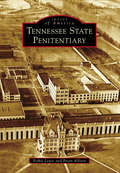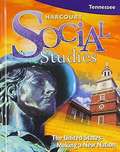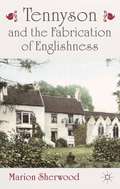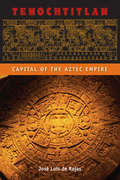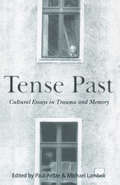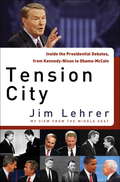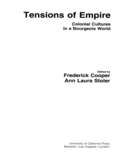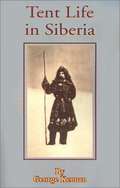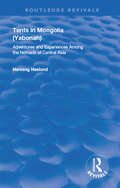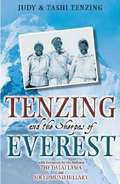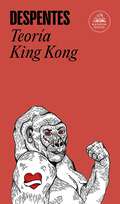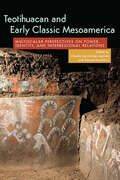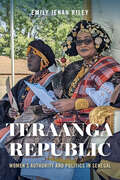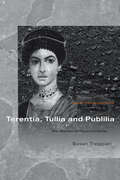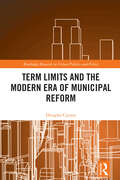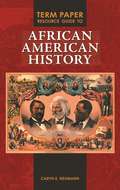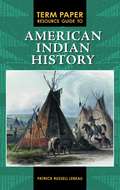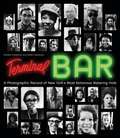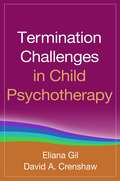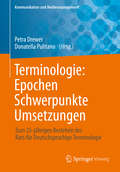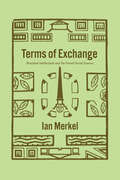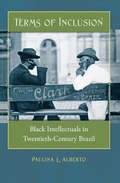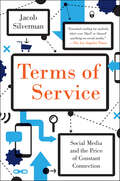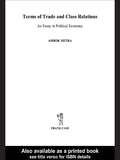- Table View
- List View
Tennessee State Penitentiary
by Yoshie Lewis Brian AllisonAs Tennessee grew into a modern state, it found itself increasingly beset by crime. In 1831, the legislature approved the construction of the first penitentiary. The pen world was violent and dark, with several major riots, fires, and escape attempts throughout the years. However, the prison also gave birth to a culture of creativity born from despair, with entertainment shows often featuring the biggest names in country music sharing the stage with inmate bands. The best-known pen, "the Castle," has become a familiar icon to filmgoers, being used in productions like The Last Castle and The Green Mile. Today, the building sits abandoned, facing an uncertain future.
Tennyson and the Fabrication of Englishness
by Marion SherwoodThrough an examination of Tennyson's 'domestic poetry' - his portrayals of England and the English - in their changing nineteenth-century context, this book demonstrates that many of his representations were 'fabrications', more idealized than real, which played a vital part in the country's developing identity and sense of its place in the world.
Tenochtitlan: Capital of the Aztec Empire (Ancient Cities of the New World)
by José Luis de RojasTenochtitlan, capital of the Aztec empire before the Spanish conquest, rivaled any other great city of its time. In Europe, only Paris, Venice, and Constantinople were larger. Cradled in the Valley of Mexico, the city is unique among New World capitals in that it was well-described and chronicled by the conquistadors who subsequently demolished it. This means that, though centuries of redevelopment have frustrated efforts to access the ancient city’s remains, much can be told about its urban landscape, politics, economy, and religion. <p><p> While Tenochtitlan commands a great deal of attention from archaeologists and Mesoamerican scholars, very little has been written about the city for a non-technical audience in English. In this fascinating book, eminent expert José Luis de Rojas presents an accessible yet authoritative exploration of this famous city--interweaving glimpses into its inhabitants’ daily lives with the broader stories of urbanization, culture, and the rise and fall of the Aztec empire.
Tense Past: Cultural Essays in Trauma and Memory
by Michael Lambek Paul AntzeTense Past provides a much needed appraisal and contextualization of the upsurge of interest in questions of memory and trauma evident in multiple personality and post-traumatic stress disorders, child abuse, and commemoration of the Holocaust. Contributors examine the historical origins of memory in psychiatric discourse and show its connection to broader developments in Western science and medicine. They address the new links between trauma and memory, and they explore how memory shapes the way traumatic events are put into narrative form. They also consider the social and political contexts in which sufferers speak and remember.
Tension City: Inside the Presidential Debates
by Jim Lehrer"In his quiet but intense way, Jim Lehrer earns the trust of the major political players of our time," notes Barbara Walters. "He explains and exposes their hopes and dreams, their strengths and failures as they try to put their best foot forward."From the man widely hailed as "the Dean of Moderators" comes a lively and revealing book that pulls back the curtain on more than forty years of televised political debate in America. A veteran newsman who has presided over eleven presidential and vice-presidential debates, Jim Lehrer gives readers a ringside seat for some of the epic political battles of our time, shedding light on all of the critical turning points and rhetorical faux pas that helped determine the outcome of America's presidential elections--and with them the course of history. Drawing on his own experiences as "the man in the middle seat," in-depth interviews with the candidates and his fellow moderators, and transcripts of key exchanges, Lehrer isolates and illuminates what he calls the "Major Moments" and "killer questions" that defined the debates, from Kennedy-Nixon to Obama-McCain.Oftentimes these moments involve the candidates themselves and are seared into our collective political memory. Michael Dukakis stumbles badly over a question about the death penalty. Dan Quayle compares himself to John F. Kennedy once too often. Barack Obama and John McCain barely make eye contact over the course of a ninety-minute discussion. At other times, the debate moderators themselves become part of the story--and Lehrer is there to give us a backstage look at the drama. Peter Jennings suggests surprising the candidates by suspending the carefully negotiated rules minutes before the 1988 presidential debate--to the consternation of his fellow panelists. Lehrer himself weathers a firestorm of criticism over his performance as moderator of the 2000 Bush-Gore debate. And then there are the excruciating moments when audio lines go dead and TelePrompTers stay dark just seconds before going on the air live in front of a worldwide television audience of millions.Asked to sum up his experience as a participant in high-level televised debates, President George H. W. Bush memorably likened them to an evening in "tension city." In Jim Lehrer's absorbing insider account, we find out that truer words were never spoken.
Tensions of Empire
by Ann Laura Stoler Frederick CooperStarting with the premise that Europe was made by its imperial projects as much as colonial encounters were shaped by events and conflicts in Europe, the contributors to Tensions of Empire investigate metropolitan-colonial relationships from a new perspective. The fifteen essays demonstrate various ways in which "civilizing missions" in both metropolis and colony provided new sites for clarifying a bourgeois order. Focusing on the eighteenth, nineteenth, and early twentieth centuries, they show how new definitions of modernity and welfare were developed and how new discourses and practices of inclusion and exclusion were contested and worked out. The contributors argue that colonial studies can no longer be confined to the units of analysis on which it once relied; instead of being the study of "the colonized," it must account for the shifting political terrain on which the very categories of colonized and colonizer have been shaped and patterned at different times.
Tent Life in Siberia
by George F. KennanFirst published in 1870, this book is a thrilling account by telegraph operator George Kennan, who signed on to build a telegraph line across Siberia in the 1860s. Though the Trans-Siberian telegraph line failed, we are left today with this tale of virtual first contact with a land and a people.
Tents in Mongolia: Adventures and Experiences among the Nomads of Central Asia (Routledge Revivals)
by Henning HaslundPublished in 1934: This book describes his adventures and experiences among the Nomads of Central Asia.
Tenzing and the Sherpas of Everest
by Judy Tenzing Tashi TenzingBiographical account of pioneer Everest climber Tenzing Norgay Sherpa, written by Sherpa's mountaineer grandson Tashi and Tashi's wife Judy. Tells the story of a poor and illiterate man who left his small ancestral village in a remote part of the Himalaya to climb the world's highest mountain. Includes descriptions of Tenzing's family and the Sherpa people.
Teoría King Kong
by DespentesTeoría King Kong es uno de los grandes libros de referencia del feminismo y de la teoría de género, un incisivo ensayo en el que Despentes comparte su propia experiencia para hablarnos sin tapujos ni concesiones sobre la prostitución, la violación, la represión del deseo, la maternidad y la pornografía, y para contribuir al derrumbe de los cimientos patriarcales de la sociedad actual. «Escribo desde la fealdad, y para las feas, las viejas, las camioneras, las frígidas, las mal folladas, las infollables, todaslas excluidas del gran mercado de la buena chica, pero también para los hombres que no tienen ganas de proteger, para los que querrían hacerlo pero no saben cómo, los que no son ambiciosos, ni competitivos, ni la tienen grande. Porque el ideal de la mujer blanca, seductora, que nos ponen delante de los ojos es posible incluso que no exista.» Críticas:«Despentes se ha convertido en una especie de heroína de culto, una santa patrona de las mujeres invisibles.»The New York Times «Pocas autoras nos sumergen como Virginie Despentes en el pantanal asfixiante en que se ha convertido nuestra época.»El País «Virginie Despentes es una de las escritoras francesas más incómodas.»Le Journal du Dimanche«Se atreve a atacar el estado actual del mundo, en constante evolución y difícil de comprender.»Radio Télévision Suisse Culture «Es un texto descarado, deslenguado, rabioso y punk escrito en el 2006 pero parece acabado ayer por la tarde.»Elena Hevia, El Periódico«Una de las feministas del momento, uno de los libros del momento.»Víctor González y Noel Ceballos, GQ
Teotihuacan and Early Classic Mesoamerica: Multiscalar Perspectives on Power, Identity, and Interregional Relations
by Claudia García-Des Lauriers Tatsuya MurakamiThe Early Classic period in Mesoamerica has been characterized by the appearance of Teotihuacan-related material culture throughout the region. Teotihuacan, known for its monumental architecture and dense settlement, became an urban center around 100 BC and a regional state over the next few centuries, dominating much of the Basin of Mexico and beyond until its collapse around AD 650. Teotihuacan and Early Classic Mesoamerica explores the complex nature of Teotihuacan’s interactions with other regions from both central and peripheral vantage points. The volume offers a multiscalar view of power and identity, showing that the spread of Teotihuacan-related material culture may have resulted from direct and indirect state administration, colonization, emulation by local groups, economic transactions, single-event elite interactions, and various kinds of social and political alliances. The contributors explore questions concerning who interacted with whom; what kinds of materials and ideas were exchanged; what role interregional interactions played in the creation, transformation, and contestation of power and identity within the city and among local polities; and how interactions on different scales were articulated. The answers to these questions reveal an Early Classic Mesoamerican world engaged in complex economic exchanges, multidirectional movements of goods and ideas, and a range of material patterns that require local, regional, and macroregional contextualization. Focusing on the intersecting themes of identity and power, Teotihuacan and Early Classic Mesoamerica makes a strong contribution to the understanding of the role of this important metropolis in the Early Classic history of the region. The volume will be of interest to scholars and graduate students of Mesoamerican archaeology, the archaeology of interaction, and the archaeology of identity. Contributors: Sarah C. Clayton, Fiorella Fenoglio Limón, Agapi Filini, Julie Gazzola, Sergio Gómez-Chávez, Haley Holt Mehta, Carmen Pérez, Patricia Plunket, Juan Carlos Saint Charles Zetina, Yoko Sugiura, Gabriela Uruñuela, Gustavo Jaimes Vences
Teraanga Republic: Women's Authority and Politics in Senegal
by Emily Jenan RileyIn Teraanga Republic, Emily Jenan Riley unveils the importance of women's patronage politics in a Muslim-majority Senegal expressed through teraanga—a pivotal concept in the Wolof language referencing hospitality, generosity, and honor. Riley challenges perceptions of governance, gender and politics, authority, and religion on a global scale, revealing the interconnectedness of republican, Indigenous, and Islamic ways of enacting politics. Teraanga Republic delves into how the women who fought for equal political representation have transformed their private expressions of teraanga and piety into public governance strategies. This rich ethnography provides an intimate look at the lives and careers of several prominent Senegalese women politicians—including a former prime minister, a justice minister, and parliamentarians—who make up one of the highest numbers of women in elected politics in the world. These women politicians derive their authority in state politics by seamlessly blending public political gestures with private acts of belonging and reciprocity, challenging the borders between state and private forms of governance and wealth distribution. In turn, their female patrons benefit socially and economically by creating solidarity groups, microenterprises, and associations with women political leaders. Bringing readers into the lived spaces of Senegalese politics, Teraanga Republic demonstrates that with the emergence of a new elite class of women politicians also comes new considerations for what women envision for themselves and their communities.
Terentia, Tullia and Publilia: The Women of Cicero's Family (Women of the Ancient World)
by Susan TreggiariStudying references and writings in over 900 personal letters, an unparalleled source, this book presents a rounded and intriguing account of the three women who, until now, have only survived as secondary figures to Cicero. In a field where little is really known about Cicero’s family, Susan Treggiari creates a history for these figures who, through history, have not had voices of their own, and a vivid impression of the everyday life upper-class Roman women in Italy had during the heyday of Roman power. Artfully assembling a rounded picture of their personalities and experiences, Treggiari reconstructs the lives of these three important women: Cicero’s first wife Terentia: a strong, tempestuous woman of status and fortune, with an implacable desire to retain control of both his second wife Publilia: shadowy and mysterious, the young submissive who Cicero wedded to compensate for her predecessor’s steely resolve and fiery temper his daughter Tullia. Including illustrations, chronological charts, maps and glossaries, this book is essential reading for students wishing to get better acquainted with the women of ancient Rome.
Term Limits and the Modern Era of Municipal Reform (Routledge Research in Urban Politics and Policy)
by Douglas CantorTerm limits enjoy broad popularity among Americans, yet scholarly literature has omitted two important questions from the study of municipal reform: Why are term limits so popular, and what are the causes of movements for term limits? In this book, Douglas Cantor exposes the causes of term limits at the local level of government to shed light on how and why the movement to adopt term limits came to exist.Cantor begins his analysis by providing a history of term limits, beginning with classical debates in Greek philosophy. He describes the benefits of studying the causes of term limits and how term limits are a direct manifestation of older values rooted in the American traditions of municipal reform. Part II examines 20 different municipalities across the continental United States that experienced a movement to implement term limits through a political campaign, voter initiative, or council-led charter amendment. Written to a common template and examining each case through the lens of the reform impulse, Cantor argues that the institutional lineage of the Progressives, namely council-manager governments, at-large elections, and nonpartisanship, is largely responsible for movements to implement term limits somewhere in the United States in almost every election.Terms Limits and the Modern Era of Municipal Reform brings a new dimension to the Progressive era, championing the study of local politics and its importance to understanding American politics.
Term Paper Resource Guide To African American History
by Caryn E. NeumannNeumann (history, Miami U. of Ohio) provides a supplemental text intended to provide high school and college students with compelling research topics for papers. It includes 100 of the most significant events in African American history, from the 16th century slave trade to Hurricane Katrina in 2005. Each topic includes an overview, suggested term paper research questions, listings of primary and secondary sources, relevant Internet Web sites, and multimedia sources. Annotation ©2009 Book News, Inc., Portland, OR (booknews.com)
Term Paper Resource Guide to American Indian History
by Patrick LebeauMajor help for American Indian History term papers has arrived to enrich and stimulate students in challenging and enjoyable ways.
Terminal Bar
by Sheldon Nadelman Stefan NadelmanIn 1972 Shelly Nadelman began a ten-year run bartending at one of New York City's most notorious dives: the Terminal Bar, located across the street from the Port Authority Bus Terminal near Times Square. For ten years, right up until the bar closed for good in 1982, he shot thousands of black-and-white photographs, mostly portraits of his customers-- neighborhood regulars, drag queens, thrill-seeking tourists, pimps and prostitutes, midtown office workers dropping by before catching a bus home to the suburbs--all of whom found welcome and respite at the Terminal Bar. This extraordinary archive remained unseen for twenty years until his son Stefan rescued the collection, using parts of it in a documentary short. Featuring nine hundred photographs accompanied by reminiscences in Shelly Nadelman's inimitable voice, Terminal Bar brings back to life the 1970s presanitized Times Square, a raucous chapter of the city that never sleeps.
Termination Challenges in Child Psychotherapy
by Eliana Gil David A. CrenshawEnding therapy in an appropriate and meaningful way is especially important in work with children and adolescents, yet the topic is often overlooked in clinical training. From leading child clinicians, this much-needed book examines the termination process/m-/both for brief and longer-term encounters/m-/and offers practical guidance illustrated with vivid case material. Tools are provided for helping children and families understand termination and work through associated feelings of loss and grief. Challenges in creating positive endings to therapy with children who have experienced trauma and adversity are given particular attention. Several reproducible forms can be downloaded and printed from the companion website in a convenient 8 1/2" x 11" size. This e-book edition features nine full-color figures. (Figures will appear in black and white on black-and-white e-readers).
Terminologie: Zum 25-jährigen Bestehen des Rats für Deutschsprachige Terminologie (Kommunikation und Medienmanagement)
by Petra Drewer Donatella PulitanoAlle, die sich mit fachsprachlichen Texten beschäftigen, beschäftigen sich automatisch auch mit Terminologie: Beim Lesen von Fachtexten nehmen sie die darin enthaltene Terminologie auf, beim Verfassen von Fachtexten verwenden oder produzieren sie Terminologie, beim Fachübersetzen übertragen sie Terminologie in andere Sprachen.Im Laufe der Zeit haben sich Methoden und Verfahren entwickelt, wie man professionell und effizient mit Terminologie arbeitet. Die Auseinandersetzung mit den Grundsätzen der Terminologiearbeit hat sich zu einer wissenschaftlichen Disziplin entwickelt.Der Rat für Deutschsprachige Terminologie (RaDT) wurde 1994 als Initiative der UNESCO-Kommissionen Deutschlands, Österreichs und der Schweiz gegründet, um terminologische Aktivitäten zu fördern. Zu seinem 25-jährigen Bestehen erscheint nun dieser Sammelband, der einen Überblick über das vielfältige Schaffen und das gesamte Themenspektrum der RaDT-Mitglieder bietet.Um die verschiedenen Perspektiven innerhalb der RaDT-Gemeinschaft angemessen wiederzugeben, umfasst der Band vier Themenbereiche:1. Vielfalt an Epochen2. Vielfalt an Schwerpunkten3. Vielfalt an Umsetzungen (in öffentlichen Institutionen)4. Vielfalt an Umsetzungen (in der Privatwirtschaft)Dieser Sammelband richtet sich an alle, die sich mit Terminologie, Terminologiewissenschaft oder Terminologiearbeit befassen, insbesondere in Unternehmensbereichen wie Sprachmanagement, Terminologiemanagement, Corporate Language, Wissensmanagement, sowie an Studierende und Wissenschaftler in den entsprechenden Disziplinen.
Terms of Exchange: Brazilian Intellectuals and the French Social Sciences (The Life of Ideas)
by Ian MerkelA collective intellectual biography that sheds new light on the Annales school, structuralism, and racial democracy. Would the most recognizable ideas in the French social sciences have developed without the influence of Brazilian intellectuals? While any study of Brazilian social sciences acknowledges the influence of French scholars, Ian Merkel argues the reverse is also true: the “French” social sciences were profoundly marked by Brazilian intellectual thought, particularly through the University of São Paulo. Through the idea of the “cluster,” Merkel traces the intertwined networks of Claude Lévi-Strauss, Fernand Braudel, Roger Bastide, and Pierre Monbeig as they overlapped at USP and engaged with Brazilian scholars such as Mário de Andrade, Gilberto Freyre, and Caio Prado Jr.. Through this collective intellectual biography of Brazilian and French social sciences, Terms of Exchange reveals connections that shed new light on the Annales school, structuralism, and racial democracy, even as it prompts us to revisit established thinking on the process of knowledge formation through fieldwork and intellectual exchange. At a time when canons are being rewritten, this book reframes the history of modern social scientific thought.
Terms of Inclusion
by Paulina L. AlbertoIn this history of black thought and racial activism in twentieth-century Brazil, Paulina Alberto demonstrates that black intellectuals, and not just elite white Brazilians, shaped discourses about race relations and the cultural and political terms of inclusion in their modern nation. Drawing on a wide range of sources including the prolific black press of the era, and focusing on the influential urban centers of S o Paulo, Rio de Janeiro, and Bahia, Alberto traces the shifting terms that black thinkers used to negotiate their citizenship over the course of the century, offering fresh insight into the relationship between ideas of race and nation in modern Brazil. Alberto finds that black intellectuals' ways of engaging with official racial discourses changed as broader historical trends made the possibilities for true inclusion appear to flow and then recede. These distinct political strategies, Alberto argues, were nonetheless part of black thinkers' ongoing attempts to make dominant ideologies of racial harmony meaningful in light of evolving local, national, and international politics and discourse. Terms of Inclusiontells a new history of the role of people of color in shaping and contesting the racialized contours of citizenship in twentieth-century Brazil.
Terms of Service: Social Media and the Price of Constant Connection
by Jacob SilvermanSocial networking has grown into a staple of modern society, but its continued evolution is becoming increasingly detrimental to our lives. Shifts in communication and privacy are affecting us more than we realize or understand. Terms of Service crystalizes this current moment in technology and contemplates its implications: the identity-validating pleasures and perils of online visibility; our newly adopted view of daily life through the lens of what is share-worthy; and the surveillance state operated by social media platforms—Facebook, Google, Twitter, and others—to mine our personal data for advertising revenue, an invasion of our lives that is as pervasive as government spying.Jacob Silverman calls for social media users to take back ownership of their digital selves from the Silicon Valley corporations who claim to know what's best for them. Integrating politics, sociology, national security, pop culture, and technology, he reveals the surprising conformity at the heart of Internet culture—explaining how social media companies engineer their products to encourage shallow engagement and discourage dissent. Reflecting on the collapsed barriers between our private and public lives, Silverman brings into focus the inner conflict we feel when deciding what to share and what to "like," and explains how we can take the steps we need to free ourselves from its grip.
Terms of Trade and Class Relations: An Essay in Political Economy
by Ashok MitraPublished in the year 1977, Terms of Trade and Class Relations is a valuable contribution to the field of History.
